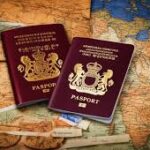Navigating the visa application process for India can be daunting, especially for first-time travelers. Understanding the Indian visa documents required and the Indian visa eligibility criteria is essential to ensure a smooth application experience. This guide aims to clarify these aspects, helping prospective travelers prepare adequately for their journey to India.
Indian Visa Documents Required for Application
When applying for an Indian visa, having the correct documents is crucial. The Indian visa documents required vary depending on the type of visa you are applying for, whether it be a tourist, business, medical, or other category.
First and foremost, a valid passport is mandatory. It should be valid for at least six months beyond your intended date of entry into India and must have at least two blank pages for visa stamping. Additionally, applicants must provide recent passport-sized photographs that meet specific requirements, such as size, background color, and quality.
Another essential document is the visa application form, which can typically be completed online. Applicants need to ensure that the form is filled out accurately, providing all requested information, including personal details, purpose of travel, and intended duration of stay.
For certain visa types, such as the business visa, additional documents may be required. For example, an invitation letter from an Indian company is usually necessary to substantiate the purpose of the visit. In the case of a medical visa, applicants must present a letter from a recognized medical institution in India, outlining the intended treatment and duration of stay.
Proof of travel arrangements is also important. This may include flight itineraries, hotel bookings, or travel plans that demonstrate the purpose and details of the trip. Some applicants may need to show financial stability through bank statements or proof of income to assure authorities they can support themselves during their stay in India.
Indian Visa Eligibility Criteria
Understanding the Indian visa eligibility criteria is equally important when applying for a visa. Each type of visa has specific requirements that applicants must meet to be considered eligible.
For tourist visas, the primary eligibility requirement is that the applicant must be a foreign national traveling to India for leisure purposes. There are generally no restrictions based on age, but individuals applying for a visa must not have a criminal record or pose a threat to national security.
For business visas, applicants must be able to demonstrate a legitimate business purpose, such as attending meetings, conferences, or negotiating contracts. An invitation letter from an Indian company can help satisfy this requirement. Additionally, applicants should have a clear business plan or project details to present if requested by immigration authorities.
Medical visa applicants must provide proof of the medical condition requiring treatment in India, along with a recommendation from a registered medical institution. Eligibility for a medical visa often involves demonstrating that the medical treatment sought is not available in the applicant’s home country.
It’s also worth noting that travelers from specific countries may have additional requirements or restrictions based on bilateral agreements with India. Therefore, it is advisable to check the official Indian government visa website for the most up-to-date information regarding eligibility.
Common Questions About Visa Documents and Eligibility
Travelers frequently have questions about the Indian visa documents required and Indian visa eligibility criteria. One common query is whether the documents need to be submitted in person or can be submitted online. Many visa applications can be completed online, but some applicants may need to visit an Indian embassy or consulate for verification and submission of physical documents.
Another common question concerns the processing time for visas. Generally, Indian visas are processed within 3 to 10 business days, depending on the type of visa and the volume of applications. However, applicants are encouraged to apply well in advance of their travel dates to account for any delays.
Many travelers also inquire about the possibility of extending their stay in India once the visa is issued. The ability to extend a visa varies based on the type of visa. Tourist visas are generally not extendable, whereas business and medical visas may allow for extensions under certain circumstances, subject to approval by Indian authorities.
In conclusion
A clear understanding of the Indian visa documents required and Indian visa eligibility criteria is essential for anyone looking to travel to India. By preparing the necessary documentation and ensuring compliance with eligibility requirements, travelers can streamline their application process and focus on experiencing all that India has to offer. With the right preparation, a visit to India can be a rewarding and memorable journey.



















Your point of view caught my eye and was very interesting. Thanks. I have a question for you.
Ищете проверенного сантехника в Минске? Мы выполняем срочный ремонт с доступными ценами. Наши практикующие мастера готовы решить любые проблемы. Узнайте больше на сантехник срочно минск.
Новый DARKNET Kraken MARKET площадка, достойная замена гидре в подпольном интернете. Моментальные переводы – после оплаты позиции деньги сиюминутно зачисляется на счет дилера. Шифрование данных – личные данные о покупателе надежно защищены от спецслужб. Кракен https://xn--krken14-bn4c.com – это достойная платформа с большим ассортиментом товара и чесными продавцами.
Thank you for your sharing. I am worried that I lack creative ideas. It is your article that makes me full of hope. Thank you. But, I have a question, can you help me?
I love your writing style really enjoying this site.
Your article helped me a lot, is there any more related content? Thanks!
This site can be a walk-by for the entire information you wished about this and didn’t know who to ask. Glimpse here, and also you’ll definitely discover it.
Balanceadora
Sistemas de ajuste: fundamental para el funcionamiento uniforme y eficiente de las equipos.
En el entorno de la innovación avanzada, donde la efectividad y la fiabilidad del equipo son de máxima relevancia, los aparatos de balanceo desempeñan un papel esencial. Estos aparatos especializados están desarrollados para equilibrar y estabilizar elementos rotativas, ya sea en maquinaria industrial, vehículos de traslado o incluso en equipos domésticos.
Para los expertos en reparación de equipos y los especialistas, operar con equipos de balanceo es crucial para promover el desempeño estable y seguro de cualquier dispositivo rotativo. Gracias a estas alternativas innovadoras modernas, es posible disminuir significativamente las oscilaciones, el sonido y la esfuerzo sobre los rodamientos, prolongando la tiempo de servicio de piezas importantes.
También relevante es el tarea que tienen los dispositivos de ajuste en la servicio al comprador. El ayuda profesional y el mantenimiento constante utilizando estos aparatos habilitan ofrecer prestaciones de excelente estándar, elevando la satisfacción de los compradores.
Para los responsables de proyectos, la aporte en unidades de balanceo y sensores puede ser fundamental para aumentar la productividad y desempeño de sus equipos. Esto es sobre todo relevante para los empresarios que administran pequeñas y pequeñas negocios, donde cada detalle importa.
Asimismo, los dispositivos de ajuste tienen una gran aplicación en el sector de la fiabilidad y el gestión de nivel. Posibilitan localizar eventuales fallos, reduciendo arreglos elevadas y daños a los sistemas. Incluso, los información obtenidos de estos sistemas pueden utilizarse para optimizar métodos y mejorar la exposición en buscadores de investigación.
Las áreas de uso de los equipos de equilibrado cubren variadas sectores, desde la producción de bicicletas hasta el monitoreo de la naturaleza. No interesa si se trata de extensas manufacturas productivas o modestos establecimientos caseros, los aparatos de balanceo son necesarios para garantizar un rendimiento efectivo y sin riesgo de interrupciones.
Быстрая и профессиональная укладка рулонного газона – это гарантия ровного покрытия и здоровой зелени на долгие годы. Команда Greenhistory.ru использует только свежий газон и правильные технологии монтажа, обеспечивая идеальный результат. Оставьте хлопоты нам – и наслаждайтесь уютной лужайкой без лишних усилий!
Jante Rimnova
Jante Rimnova
娛樂城,通常指的是一個線上賭博平台,提供各種娛樂遊戲,如賭場遊戲、體育博彩、電子遊戲等。這些平台讓玩家可以在網路上進行賭博,而不需要親自前往實體賭場。娛樂城通常包含了各式各樣的遊戲選項,例如百家樂、輪盤、老虎機、撲克等,並且透過即時娛樂、直播等技術,提升了玩家的沉浸感和互動性。現今的娛樂城大多數已經支援手機和桌面端的多平台操作,讓玩家可以隨時隨地參與遊戲,這樣的便利性使得它們受到全球玩家的青睞。此外,娛樂城也會推出不同的優惠活動、註冊獎金和忠誠計劃,吸引新用戶並保持老用戶的活躍度。然而,娛樂城的風險也不可忽視。由於賭博本身具有高度的娛樂性,但也存在可能的成癮問題。多數國家對於線上賭博有著嚴格的法律規範,玩家在選擇娛樂城平台時,應該格外留意平台的合法性和安全性,以避免陷入詐騙或遭遇其他法律風險。因此,理性投注並了解相關法律是每位玩家應該保持的基本態度。
Наконец-то нашёл отличный сервис для ремонт геймпада! После года интенсивного использования джойстики стали заедать. Мастера быстро определили проблему и заменили изношенные детали. Теперь играю с удовольствием, как на новом контроллере!
Mobile-Worker предлагает полный спектр услуг: от программного ремонта до восстановления после влаги. Мы не просто ремонтируем – мы продлеваем жизнь вашей технике. Специальное предложение – защита экрана гидрогелевой плёнкой с профессиональной установкой.
娛樂城大解析
娛樂城,通常指的是一個線上賭博平台,提供各種娛樂遊戲,如賭場遊戲、體育博彩、電子遊戲等。這些平台讓玩家可以在網路上進行賭博,而不需要親自前往實體賭場。娛樂城通常包含了各式各樣的遊戲選項,例如百家樂、輪盤、老虎機、撲克等,並且透過即時娛樂、直播等技術,提升了玩家的沉浸感和互動性。現今的娛樂城大多數已經支援手機和桌面端的多平台操作,讓玩家可以隨時隨地參與遊戲,這樣的便利性使得它們受到全球玩家的青睞。此外,娛樂城也會推出不同的優惠活動、註冊獎金和忠誠計劃,吸引新用戶並保持老用戶的活躍度。然而,娛樂城的風險也不可忽視。由於賭博本身具有高度的娛樂性,但也存在可能的成癮問題。多數國家對於線上賭博有著嚴格的法律規範,玩家在選擇娛樂城平台時,應該格外留意平台的合法性和安全性,以避免陷入詐騙或遭遇其他法律風險。因此,理性投注並了解相關法律是每位玩家應該保持的基本態度。
Your article helped me a lot, is there any more related content? Thanks!
mlb運彩分析
戰神賽特
「戰神賽特」— 2025年最火爆的老虎機,等你來挑戰!
如果你正在尋找一款高賠率、刺激又充滿神秘感的老虎機遊戲,那麼「戰神賽特」絕對是你的最佳選擇!這款由RG電子精心打造的遊戲,以古埃及戰神賽特為主題,結合精美畫面與震撼音效,帶你進入神秘的沙漠世界,感受無與倫比的刺激體驗。
為何玩家瘋狂愛上戰神賽特?
超狂賠率 51,000 倍:一轉瞬間,財富翻倍不是夢
高RTP達96.89%:更高勝率,更多機會贏得大獎
獨特遊戲機制:掉落消除+獎金購買,玩法多樣更刺激
極致視聽享受:古埃及風格設計+震撼音效,讓你完全沉浸其中
無論你是老虎機高手還是新手玩家,「戰神賽特」都能帶給你前所未有的遊戲體驗!快來挑戰戰神,贏取屬於你的豐厚獎勵!
Can you be more specific about the content of your article? After reading it, I still have some doubts. Hope you can help me.
кайтинг в благе
кайт школа хургада
Thanks for sharing. I read many of your blog posts, cool, your blog is very good.
Dzięki Mostbet możesz obstawiać i wygrywać każdego dnia | Z Mostbet możesz zagrać na automatach, ruletce i w pokera | Grając w Mostbet masz dostęp do wsparcia technicznego 24/7 http://www.mostbet.com
Zaskakująco duży wybór legalnych bukmacherów z cashbackiem | Pomocna porównywarka legalnych bukmacherów | Świetne opisy promocji i ofert dla nowych graczy | Przyjazny interfejs i łatwość poruszania się po stronie | Kasyna dostępne na urządzeniach mobilnych – to duży plus | Świetna selekcja zakładów bukmacherskich esportowych | Zestawienie kasyn online z szybkimi wypłatami | Możliwość rejestracji bez ryzyka – bonus bez depozytu | Szybka rejestracja i natychmiastowy bonus powitalny zakłady lol.
Dzięki Mostbet możesz obstawiać ulubione dyscypliny sportowe w Polsce. | Sprawdź aplikację mobilną Mostbet dla wygodnego dostępu do gier. | Mostbet umożliwia grę w trybie demo bez ryzyka utraty środków. | Mostbet oferuje zakłady na e-sporty i wydarzenia specjalne. mostbet pl
Вагончики и временные конструкции: эффективное способ для клиентских целей
Вагончики и модульные здания позволяют создать производственную площадку, хранилище или временный модуль. Команда обеспечиваем объекты, которые соответствуют строгим требованиям долговечности и удобства.
Преимущества
Устойчивость. Все вагончики выполнены из элементов, устойчивых к давлению и климатическим факторам.
Скорость доставки. Конструкция доставляется на место в срок 1–2 суток после подписания договора.
Индивидуальная адаптация. Осуществляется установка термоизоляции, электросетей или воздухообмена.
Где применяются
На объектах строительства для хранения инструментов или устройства комнаты для рабочих.
Во время событий для организации стойки приёма или зоны хранения.
В качестве временно используемых помещений или управляющих центров.
Выгоды
Ускорение процессов. Не требуется возводить временные сооружения.
Удобство. Обстановка, которые улучшают качество выполнения задач бригады.
Адаптивность. Шанс краткосрочного пользования или покупки под разные периоды и ресурсы.
Опыт внедрения
Подрядчик применила модульное здание для создания хранилища и помещения для персонала. Конструкция была доставлена на место за 24 часа, с специальным утеплением. Пользователь выделил на улучшение обстановки и сокращение простоя.
Как связаться с нами
Для оформления заказа достаточно написать с нами. Дадим исчерпывающие сведения, поможем выбрать лучший вариант и обеспечим перевозку.
Doporucuji Mostbet pro jeho širokou nabídku her | Mostbet online hry jsou zábavné a rozmanité | Mostbet představuje novou úroveň online hraní mostbet casino login.